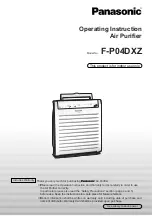
iii
iii
HWE10130
GB
Precautions for handling units for use with R410A
CAUTION
Use refrigerant piping made of phosphorus deoxidized
copper and copper alloy seamless pipes and tubes. In
addition, be sure that the inner and outer surfaces and
the end faces of the existing and new pipes are clean
and free of hazardous sulphur, oxides, dust/dirt, shav-
ing particles, oils, moisture, or any other contaminant.
Contaminants on the inside of the refrigerant piping may
cause the refrigerant oil to deteriorate or cause the air con-
ditioning unit to malfunction.
Store the new piping to be used during installation in-
doors and keep both ends of the piping sealed until
just before brazing. (Store elbows and other joints in a
plastic bag.)
If dust, dirt, or water enters the refrigerant cycle, deteriora-
tion of the oil and compressor failure may result.
Use a small amount of ester oil, ether oil, or alkylben-
zene to coat flares and flanges.
Infiltration of a large amount of mineral oil may cause the re-
frigerant oil to deteriorate or cause the air conditioning unit
to malfunction.
Charge liquid refrigerant (as opposed to gaseous re-
frigerant) into the system.
If gaseous refrigerant is charged into the system, the com-
position of the refrigerant in the cylinder will change and
may result in performance loss.
Use a vacuum pump with a reverse-flow check valve.
If a vacuum pump that is not equipped with a reverse-flow
check valve is used, the vacuum pump oil may flow into the
refrigerant cycle and cause the refrigerating machine oil to
deteriorate.
Prepare tools for exclusive use with R410A. Do not use
the following tools if they have been used with the con-
ventional refrigerant (gauge manifold, charging hose,
gas leak detector, reverse-flow check valve, refrigerant
charge base, vacuum gauge, and refrigerant recovery
equipment.).
If the refrigerant or the refrigerating machine oil left on
these tools are mixed in with R410A, it may cause the re-
frigerating machine oil to deteriorate.
Infiltration of water may cause the refrigerating machine
oil to deteriorate.
Gas leak detectors for conventional refrigerants will not
detect an R410A leak because R410A is free of chlorine.
Do not use a charging cylinder.
If a charging cylinder is used, the composition of the refrig-
erant will change, and the unit may experience power loss.
Exercise special care when handling the tools for use
with R410A.
Infiltration of dust, dirt, or water into the refrigerant system
may cause the refrigerating machine oil to deteriorate.
Summary of Contents for PUHY-RP200
Page 9: ...HWE10130 GB ...
Page 11: ... 2 ...
Page 21: ... 12 I Read Before Servicing GB HWE10130 ...
Page 23: ... 14 ...
Page 63: ... 54 II Restrictions GB HWE10130 ...
Page 65: ... 56 ...
Page 75: ... 66 ...
Page 83: ... 74 IV Remote Controller GB HWE10130 ...
Page 85: ... 76 ...
Page 89: ... 80 ...
Page 95: ... VI Refrigerant Circuit 86 HWE10130 GB ...
Page 97: ... 88 ...
Page 121: ... 112 VII Control GB HWE10130 ...
Page 123: ... 114 ...
Page 159: ... 150 ...
Page 259: ... 250 IX Troubleshooting GB HWE10130 ...
Page 261: ... 252 ...





































